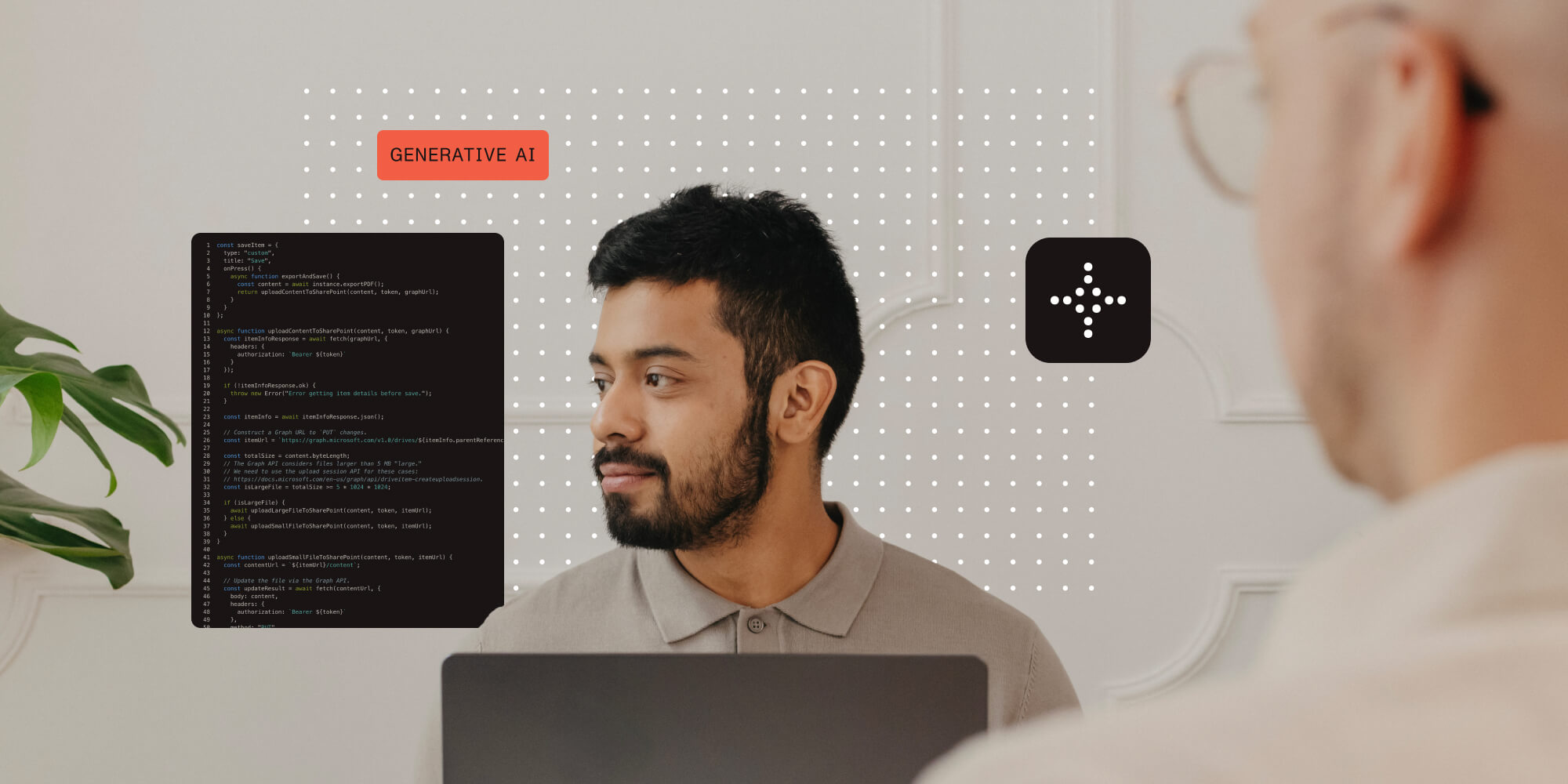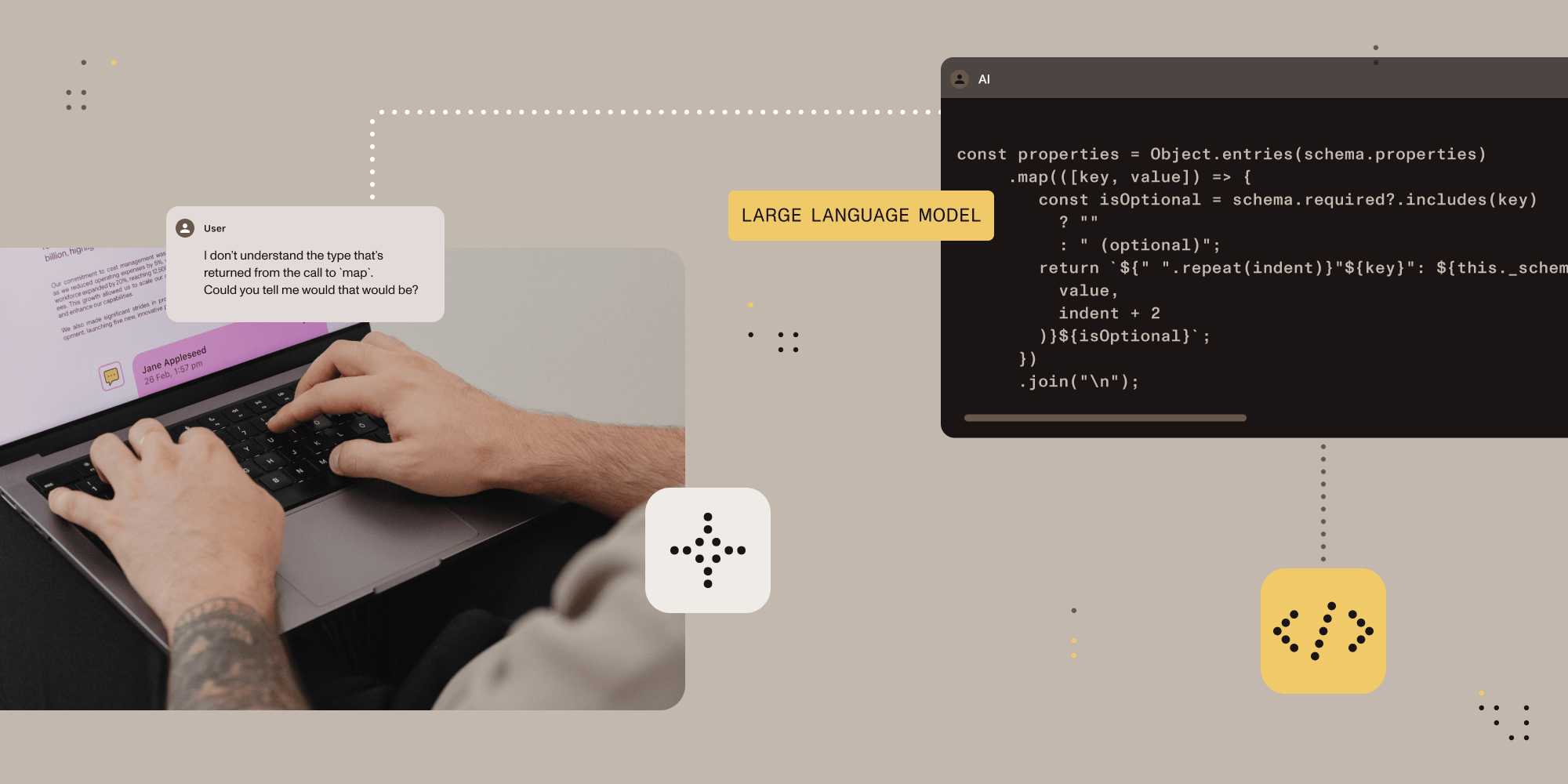
Generative AI has evolved rapidly, and modern software products seem to be in a race to demonstrate its capacity to create content, design products, and even write code with minimal human intervention. This evolution prompts an important question: Could generative AI replace engineers, especially those working on software development kits (SDKs) and developer tools, in the near future? In this article, I’ll explore the potential of generative AI within the context of SDKs and developer tools, examining its current capabilities and its impact on software development, as well as reflecting on the ethical and practical considerations of such a shift.

For more on this topic, check out Programming in the AI era.
The rise of Generative AI
In this section, we’ll delve into the rapid advancements in generative AI, exploring its fundamental principles and key technologies, as well as the significant milestones that have propelled it to the forefront of software development.
What is Generative AI?
Generative AI refers to systems that generate new content based on the data they’ve been trained on. Unlike traditional AI, which focuses on analyzing data to make predictions or decisions, generative AI uses advanced algorithms like generative adversarial networks (GANs) and transformers — the “T” from “GPT” (generative pre-trained transformers) — to create new content, which is sometimes indistinguishable from human-created work. This includes generating code, designing APIs, and even building entire software libraries.
Key developments in Generative AI
Generative AI has achieved remarkable technological advancements that contribute to its capabilities in various domains:
-
Natural Language Processing (NLP) — The development of advanced models like GPT-4, as well as the more recent and exponentially more impressive GPT-0, has enabled AI to understand and generate human-like text, unlocking the possibility to deliver coherent documentation, generate user guides, and draft legal texts.
-
Software development — AI-driven tools can now write, debug, and optimize code both by understanding natural language descriptions and by borderline analyzing the flow of execution, significantly enhancing the efficiency of coding processes.
Furthermore, advancements in machine learning (ML) algorithms and continuous refinement of large language models (LLMs) have made it possible for AI to design robust and scalable APIs, improving the functionality and user experience of SDKs and developer tools.
These technological strides underpin the growing potential of generative AI in transforming critical areas of software engineering.
Current capabilities of Generative AI in SDK development
Here, we’ll examine the practical applications of generative AI within SDK development, highlighting its new role in code generation, API design, documentation automation, and testing and debugging processes.
GenAI in code generation
Generative AI is in the process of changing code generation. Tools like OpenAI’s Codex and GitHub Copilot are able to write code snippets from natural language descriptions, assist developers by making code suggestions, identify bugs, and reduce the number of errors in a final product.
SDK engineers actively using generative AI tools to write code can streamline development by automating repetitive coding tasks, generating boilerplate code, and even suggesting optimal design patterns. This leads to significant enhancement of developer productivity in the SDK space.
While the potential here is massive, our experience at Nutrient in using AI tools — an experience shared by many other software companies we interface with — is that generated code still requires significant human intervention to vet and enhance it before it’s production-ready.
GenAI in API design
Designing APIs is a critical aspect of developing SDKs and libraries. Tools powered by generative AI can analyze existing APIs, understand usage patterns, and suggest improvements and new features. This not only enhances the functionality of the SDKs, but it also ensures that they’re more user-friendly (as well as AI-friendly!) and efficient.
GenAI in documentation
Documentation is a critical component of any SDK. AI tools can automate the generation of documentation, ensuring it’s comprehensive and up to date. This can not only save SDK developers significant time and ensure that software builders that rely on their products have access to accurate information, but it can also produce AI-ready documentation (documentation structured in a way that makes it easier for AI to leverage to generate code).
GenAI in testing and debugging
Testing and debugging are time-consuming but essential parts of software development. Big tech software companies employ rigorous testing that includes all dependencies. When it comes to SDKs, these tests are often the key ingredient of production software, making it critical for companies to provide reliable tests and streamline the debugging process.
Generative AI can automate testing and debugging processes for SDKs by generating test cases, identifying bugs, and suggesting fixes. This can significantly reduce the time spent on these tasks and improve the reliability of the SDK.
Impact on the SDK and developer tool profession
This section will discuss how generative AI is reshaping the professional landscape for SDK engineers and developer tools, focusing on efficiency gains, evolving skill requirements, and the balance between feared job displacement and job creation.
Efficiency and productivity gains
Generative AI can significantly enhance productivity by automating repetitive tasks and allowing SDK developers to focus on more complex and innovative aspects of their work. For instance, in SDK development, AI can handle routine coding tasks, freeing up developers to work on creating more sophisticated and high-value functionality.
Skill requirements are shifting
As AI takes over more routine tasks, the skillset required for developers is bound to significantly shift. Future SDK developers will need to have a strong understanding of AI tools and how to leverage them effectively. This might also include learning new programming languages and becoming proficient in AI and ML concepts.
It’s becoming more and more obvious that we’re witnessing a major retooling in the software engineering space of a magnitude that we haven’t seen before. The question that lends itself to this fact is: Are most software engineers ready for the change?
Job displacement and creation
While generative AI can enhance a significant subset of an SDK software engineer’s tasks, and almost replace engineers — as fewer people are now capable of achieving similar outcomes — it’s also likely to create new job opportunities. Human control will likely remain a necessity, and developers will be needed to develop, maintain, and improve AI systems. Additionally, the implementation of AI in SDKs and developer tools will require oversight, ethical considerations, and special attention paid to regulatory compliance, creating roles that specifically focus on these areas.
Ethical and practical considerations
This section will explore the ethical and practical challenges posed by generative AI in SDK development, addressing issues such as accountability, intellectual property, data dependency, integration with existing systems, and data privacy concerns.
Ethical implications
The use of generative AI in developing SDKs raises a number of ethical questions. One major concern is accountability. If an AI-designed SDK causes a critical failure in a production application, who is responsible? Additionally, concerns about bias in AI systems — which can lead to unfair or unsafe designs if not properly managed or vetted by humans — are more than justified.
The other major concern is intellectual property (IP). AI systems often train on vast datasets that may include proprietary information, often unbeknownst to operators who instigate training. This can lead to issues of stolen IP, where AI-generated outputs inadvertently replicate proprietary code or designs, creating legal and ethical challenges for developers.
Practical challenges
-
Dependency on structured data — Generative AI systems require large amounts of high-quality data to function effectively. In fields where data is scarce or difficult to obtain, the application of AI may be limited. This challenge is lessened in the world of SDKs, where the emphasis is on developer experience — as the expectation is that theses SDKs will ship with detailed, well structured API references — and where open source libraries continue to “feed” the generative AI machine.
-
Integration with existing systems — Implementing AI in existing development workflows can be challenging. It requires significant investment in technology and training, as well as a cultural shift within organizations.
-
Data privacy concerns — Handling data privacy is a new challenge when using generative AI. These systems must ensure that they don’t violate data privacy regulations — especially when dealing with personal or confidential information — where they have to comply with regulations. Developers need to implement robust measures to protect data privacy. This can complicate the deployment and use of AI in SDKs, where developers are often unable to foresee how an SDK will be deployed and used, due to the increased complexity of prompts that make it more difficult to get good results.
The future of Generative AI in SDK and developer tools
Now, we’ll look ahead to the future possibilities and advancements of generative AI in development of SDK and developer tools, focusing on continuous technological growth, the evolving collaboration between humans and AI, and the necessary shifts in education and training to prepare for this new landscape.
Continued advancements
The capabilities of generative AI are expected to continue growing at an exponential rate. Advances in machine learning algorithms, increased computational power, and the availability of large datasets will drive this growth. Client devices such as smartphones and tablets, as well as browsers, will surely offer LLMs with smaller signatures, and developers will find new ways to ship SDKs with built-in AI capabilities that leverage them.
New possibilities for AI applications in SDK and developer tool development are bright and clear on the horizon: from more complex code generation, to fully autonomous generation of software workflows that leverage these SDKs to provide value to end users.
Human-AI collaboration
The future of software development is likely to involve a close collaboration between humans and AI. Rather than completely replacing developers, AI will augment their capabilities, allowing them to achieve more than ever before. Developers will work alongside AI systems, leveraging their computational power and creativity to tackle complex problems.
Education and training
To prepare for this future, software engineering education will need to evolve. This includes incorporating AI and machine learning into software development studies, creating AI-first software development curricula, and providing ongoing training for professionals. By doing so, developers will be equipped to harness the power of generative AI and adapt to the changing landscape of their profession.

For more on this topic, check out Leveraging AI to conquer unfamiliar programming languages.
Conclusion
So, is generative AI actually going to replace SDK engineers? On one hand, no. The human element remains crucial, despite the fact that AI can automate many aspects of development. Developers bring creativity, ethical judgment, and a deep understanding of complex systems that AI cannot replicate. Instead of completely replacing them, generative AI is poised to become a powerful tool that enhances developers’ capabilities, drives innovation, and opens up new possibilities in software development.
On the other hand, yes. It’s becoming increasingly clear that the sheer productivity boost will empower individual developers to achieve more, potentially reducing the amount of engineering talent needed to generate results. Combined with the gains in quality — as there’s another pair of (AI) eyes involved in software engineering — we can safely conclude that the SDK engineer leveraging generative AI will become a different beast, essentially replacing the engineer of the present (or several of them).
As we look to the future, it’s essential to address the ethical and practical challenges associated with generative AI. By doing so, we can ensure that this technology is used responsibly and effectively, ultimately benefiting society as a whole. The future of software development is one where human ingenuity and AI innovation go hand in hand, creating a world of possibilities that were previously unimaginable.
At the very end, I offer honest advice to my fellow software engineers, especially the ones in the SDK space: Don’t wait until it’s too late; start your AI journey now. Reskilling can sound daunting, but we’ve all done it dozens of times with every new programming language, framework, library, or SDK. Embrace the change and become the next major version of yourself.




